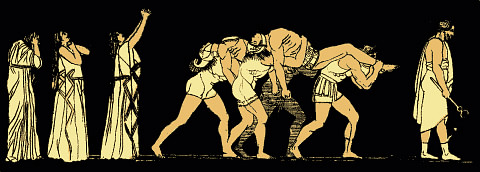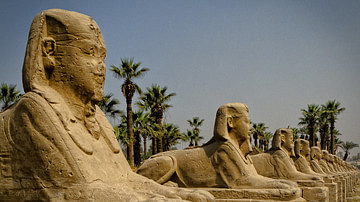
The Suppliants (also given as Suppliant Women) is a Greek tragedy written by Euripides, not to be confused with Aeschylus' tragedy of the same title. Its exact date of production is not known, possibly around 424 to 420 BCE, and may have been written for competition at the Dionysia. Like many of his other works, it deals with a story commonly known to most of those in the audience. According to Aeschylus's play Seven Against Thebes and Sophocles' Antigone, the sons of Oedipus share the throne of Thebes, each ruling for one year. However, Eteocles refuses to relinquish power to his brother, Polynices. The exiled Polynices leaves Thebes and travels to Argos, marries the king's daughter, raises an army, and returns to Thebes to seize the throne. Eteocles and Polynices both die in battle, and Creon, their uncle, now rules. Although Eteocles has been given the proper burial rites, Creon refuses to allow King Adrastus of Argos to bury the dead Argive soldiers who still litter the grounds surrounding Thebes. Along with the wives and mothers of the fallen soldiers, King Adrastus travels to Athens to appeal to Theseus for help to recover the dead.
Euripides
Little is known of Euripides' early life. He was born in the 480s BCE on the island of Salamis near Athens to a family of hereditary priests. He preferred a life of seclusion alone with his books. Peter Jones in his book Veni Vidi Vici wrote that Aristophanes mocked Euripides, calling him an intellectual and a book collector. However, he was married and had three sons, one of whom became a minor playwright. Unlike his fellow tragedian Sophocles, Euripides played little or no part in Athenian political affairs; the one exception was a brief diplomatic mission to Sicily. With the war against Sparta still waging, he left Athens in 408 BCE at the invitation of King Archelaus to live the remainder of his life in Macedonia.
Of his 92 plays, 19 still exist in their entirety. The poet made his debut at the Dionysia in 455 BCE, performing over 22 times, only to win his first victory in 441 BCE. Unfortunately, his participation in these competitions did not prove to be very successful with only four victories; a fifth came posthumously for Iphigenia in Aulis. However, many believe that it may have completed by Euripides' son after his father's death in 406 BCE. Some believe his disappointment at the Dionysia drove him to leave Athens.
The Greek philosopher Aristotle called Euripides the most tragic of all of the Greek poets. Classicist Edith Hamilton in her book The Greek Way agreed when she wrote that he was the saddest of the poets, a poet of the world's grief. It is said that children learned language and grammar from both Homer and Euripides. Although often misunderstood during his lifetime and never receiving the acclaim he deserved, he became one of the most admired poets long after his death, influencing not only Greek drama but Roman literature. His fellow playwright Aristophanes often parodied him in many of his plays.

Cast of Characters
- King Adrastus of Argos
- Theseus
- Aethra (mother of Theseus)
- Evadne (widow of a fallen Argive)
- Iphis (Evadne's father)
- The goddess Athena
- Messenger
- Herald
- Chorus of Argive women
The Play
The play begins at the temple of Demeter and Persephone at Eleusis, outside Athens. Aethra, the mother of Theseus, sits at the feet of the altar. Around her are the mothers and sons of the seven who lost their lives at Thebes. Adrastus, king of Argos, lies nearby. She speaks:
Demeter, enshrined in this land Eleusis, and you who tend the goddess' temple, bless me and bless Theseus my son and the city of Athens … So I pray as I look upon these women burdened with years, who left their homes in Argos to fall with supplicant branches at my feet in dreadful loss: their seven sons are dead at Cadmus' gates and they are childless. (139-140)
She looks upon the mothers of the seven and adds:
They (their sons) perished in the struggle, and their mothers desire to bury them but those in power spurn what the gods hold lawful and refuse even to grant removal of the bodies. (140)
She has sent for her son Theseus to either “drive from the land these people and the distress they bring or free them from their supplicant needs.” (140) Theseus arrives and asks his mother to explain the presence of the grieving women. She tells him of their plight and introduces him to the cloaked Adrastus. Theseus turns to the old king: "Leave off your wailing, bare your head and speak: nothing advances without the tongue's help. (145)"

I am ashamed - a gray-haired man who once was king, and fortunate - that now I fall to earth and clasp your knee; and yet I must submit to my disaster. Save my dead. Have pity on my woes, and on these mothers of fallen sons. (147)
In answer to the old king's plea, Theseus chastises Adrastus for foolishly attacking Thebes; he had gone against the wishes of the gods. He adds:
And so I am to be your ally? What fine words will make my citizens favor that? Farewell! You planned your actions poorly. Take what comes and wrestle with fate alone, and let us be. (149)
The king realizes he has to accept Theseus' decision and must leave Athens. However, before the old king prepares to leave, Aethra (appealing to her son's ego) speaks to Theseus: “…I bid you: first look to the gods for if you slight them you will fall ….” (151). She emphasizes that it would be an honor for him if he would help the poor, grieving women and bury the dead who are being denied the rights of burial and their funerals. He would win a “crown of glory” for the city of Athens. Theseus listens to his mother and sees the truth and logic in her plea. He has a change of heart and realizes that the Greeks expect him to “punish wickedness.” He decides to help Adrastus and retrieve the dead. First, however, he must plead the case to the people of Athens and ask them to help him retrieve the bodies of the dead from Creon. He sends a messenger to Thebes to ask that they allow the dead to be given the proper burial rites; however, if the request is refused, the Athenians are prepared for battle.
A Theban herald arrives with an ultimatum to Athenian leadership:
To whom must I give the word I bring from Creon, ruler in Cadmus' country since Eteocles fell at his brother Polynices' hand beside the seven mouthed gate? (155)
Theseus replies that Athens has no master, for it is a free city. The impudent herald says he is from a city ruled by one man, not a mob. Theseus responds that nothing is worse than an absolute ruler - one man has all of the power and there is no equality. “With written laws, people of small resources and the rich both have the same recourse to justice.” (156) He asks for the purpose of the herald's visit, who tells him if Adrastus comes to Athens, he must be driven out. If Theseus lets him in “there will be much rough water.” The fallen Argives shall not be buried for they died by “their own insolence.”
Theseus ignores the herald's harsh words and states that the dead must be properly buried, for the corpses present no threat to Thebes:
… you ought to grant the bodies of the fallen to us, who wish to do them reverence. If you choose otherwise, my course is clear; I shall compel their burial. (160)
Although the herald returns a threat, Theseus stresses his decision to bury the bodies away from Thebes and adds, “Take the foolish words you brought, and leave the country. Talk will gain us nothing” (161). The herald leaves.
After some time, a messenger arrives, bringing news of Theseus' victory at Thebes. He describes the Athenian assault on the city:
Then all the middle of the field was spattered as men slew and were slain: and the word passes, shouted among them: Strike! Thrust back the spear at Erechtheus' sons! ... Then there were cries and groans throughout the city from young and old: frightened, they thronged the temples. (165)
Theseus did not sack the city for that was not in his plans. When asked by the mothers, the messenger tells them of the burial place of some of the dead - near Cithaeron's field - while others were brought with them. The victorious Theseus arrives. He questions Adrastus about the lineage of some of the dead. Adrastus identifies Capaneus, Eteocles, Hippomedon, Parthenopaeus, Tydeus, and Oecles. Theseus tells him that the men will be buried on one pyre and that he will also build a tomb. Adrastus asks the Athenian king if the mothers of the dead could see corpses, but Theseus disagrees for it would bring them "mortal pain".

The goddesses Athena appears above them, for there is a duty that Theseus must perform. She says Theseus must not let the bones of the fallen leave Athens in the hands of the young sons. She adds that Adrastus must make a vow:
Argos will never bring against this country its armed forces in war. And if others try to invade it, she will resist them by arms. (184)
If he breaks this vow, Argos will fall in ruin. She says they must “escort the dead from the land, and dedicate a shrine to the god beside the crossroad to the Isthmus, where the bodies were purified by fire" (185). When the sons of the seven have grown, they will attack Thebes, avenging the death of their fathers. Theseus says he will obey her wishes and Adrastus will obey his oath.
Conclusion
Despite not being one of Euripides' best-known works, Suppliants has survived. And while it is no longer performed and has little or no influence on modern literature, it does add to the myth surrounding the defeat of the Argives at Thebes; an addendum to the plays of Aeschylus and Sophocles. The audience, of course, is well-aware of the myth surrounding the fall of the seven. In Euripides' play, King Adrastus pleads with Theseus to retrieve the dead sons of Argos. Although reluctant at first, the Athenian king listens to the logic of his mother and decides to help Adrastus. At the end of play, Theseus and Adrastus are visited by the patron goddess Athena. Theseus is given instruction concerning the building of a shrine while Adrastus must not wage war against Athens. Finally, she vows that the sons of the seven will one-day seek revenge against Thebes. The plays of Aeschylus and Sophocles leave a reader or audience member wondering about the unburied that lay outside the city gates. The death of Polynices is answered, for Antigone sacrifices her life for her brother. Euripedes' play provides finality to the Seven Against Thebes.







